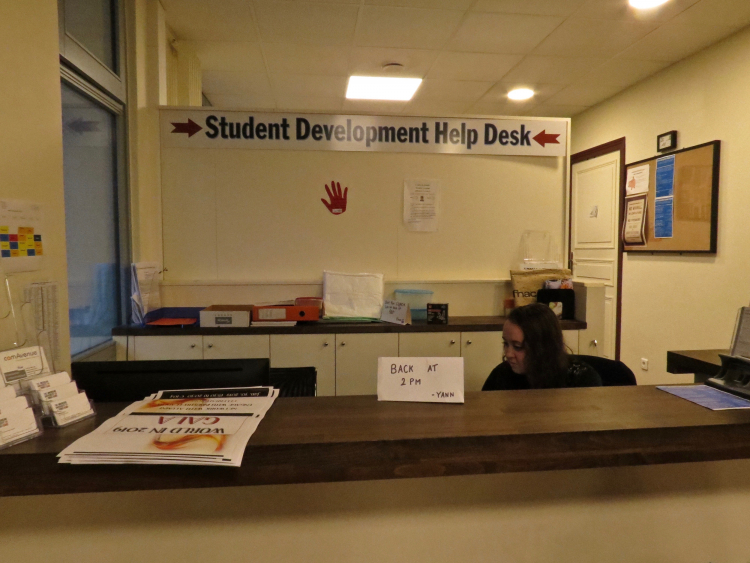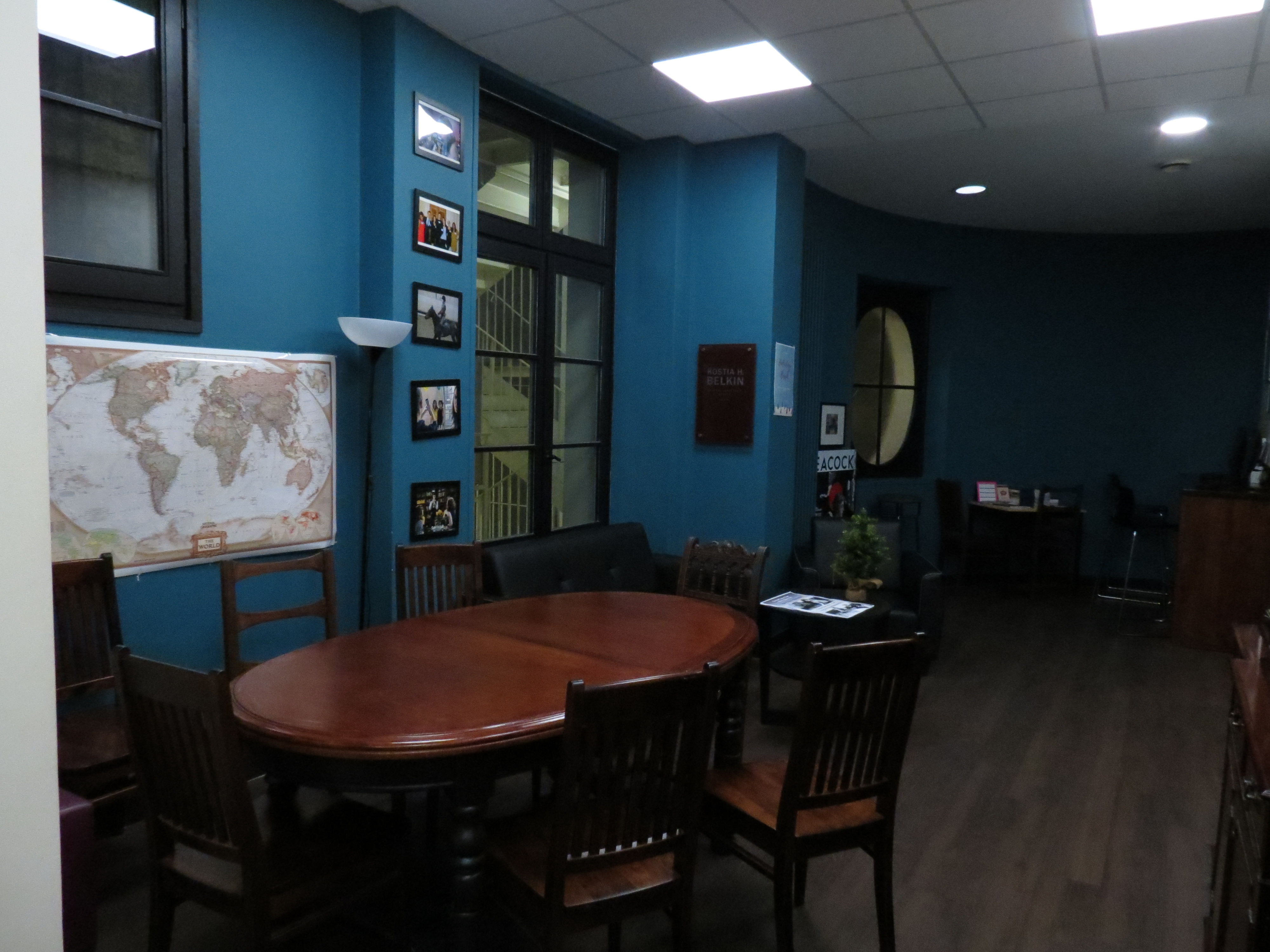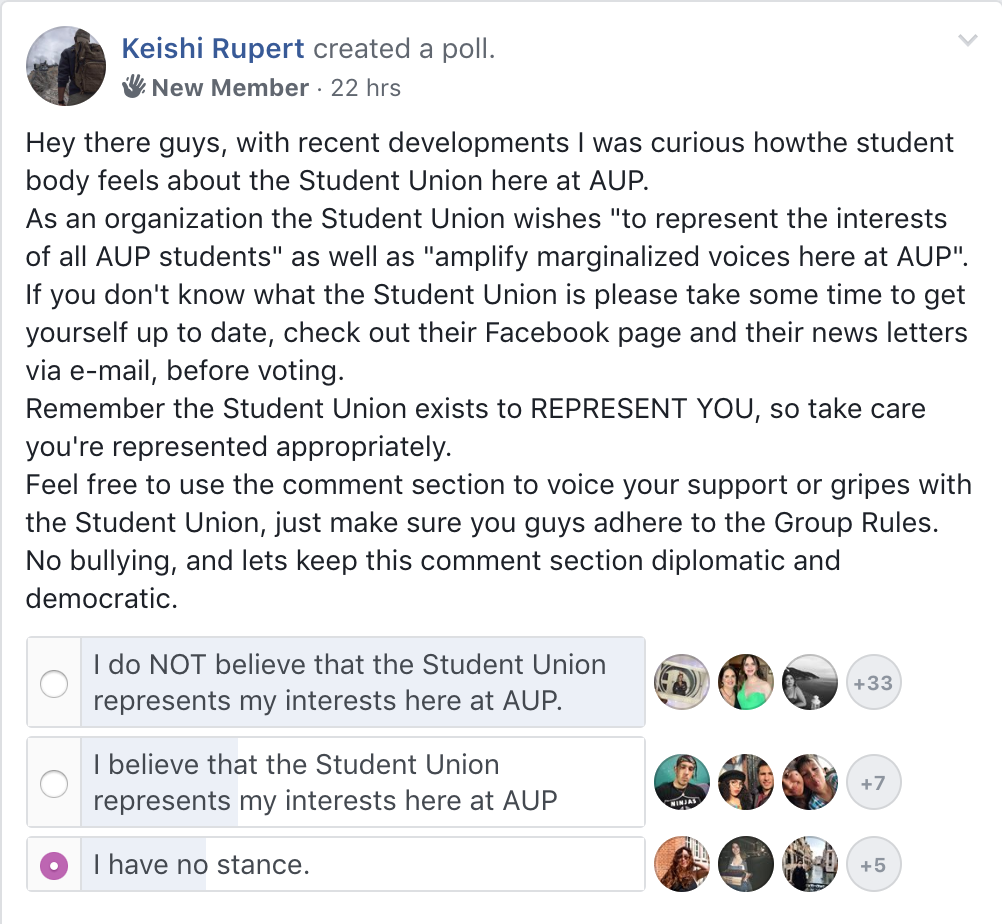The AUP Student Union's SMIC Campaign is Gaining Headway

Change is coming, but a rift may be forming between the students at the American University of Paris. Since the Student Union’s SMIC campaign first began to take over campus news, the Union has been challenged by several students who feel they are not being truthfully represented. Many may consider their cause to be just, but perhaps even a majority of students disagree with their tactics. After a charged early morning meeting with AUP President Celeste Schenck and the Student Union just four days after the Union published their Call to Action against the advisement of the AUP brass, the Grant Program is in the process of being restructured, but the repercussions that will come from the decision to alter the program remain unknown.
On Friday, November 30, AUP President Celeste Schenck and Vice President for Finance and Administration Valérie Fodé met with the AUP Student Union President Dhouha Djerbi and Vice President Maria Sarmiento, regarding the Union’s SMIC campaign to increase student workers’ grant funds to match the French minimum wage. Dean of Student Affairs Kevin Fore, GSC President Emily Ide, and USC Vice President Chiara Amor were also in attendance.
While un-sourced rumors have circulated that the grant program through which student workers are paid will be shut down next semester, these claims appear to be unfounded. On the contrary, President Schenck suggested during last Friday’s meeting that a raise of 30 percent for student workers is a possibility for next semester.
This raise of 30 percent would bring the grant closer to the Union’s goals as it would amount to €7.80 per hour, just €.20 below €8 per hour, which is approximately the same amount as the French minimum wage after taxes.
President Schenck said that the AUP administration acknowledges that the grant program grew quicker than expected and without enough oversight. She told the Union that Fodé and the rest of AUP are working to restructure the program in a way that serves the interests of AUP as a whole.
Two other major requests in the Student Union’s SMIC campaign that were brought up to President Schenck may be included in the restructuring of the grant program. One would allow student workers to receive monthly paychecks, as student workers are currently paid a lump sum at the end of the semester. President Schenck did not dismiss this point, even acknowledging that the administration would take it under advisement, but seemed unable to state whether or not this would be possible.
Earlier this week, the Plume spoke with students frustrated about the lack of monthly paychecks. The money paid at the end of the semester can either be applied to a student’s tuition or given to them as a check. Jane Addington-May, a 20-year-old junior working in the Housing Office, told the Plume that “We don't get paid until the end of the semester so all the money I'm making this semester, I can't use.”
Chelsea Kessler-Bauersfeld, a 22-year-old marketing major graduating this year who works for the Student Development Office, shared Addington-May’s frustration “...at the end of the semester if I run out of money after my loan, I will have something to hold me over, but it doesn’t help the fact that I don’t have it during the semester so I have to compensate for that.”
The AUP Student Leadership Lounge Image Credit: Leonardo Tow
The Union’s second request is that the program be need-based. President Schenck told the Student Union and the Student Council members that a need-based program was their initial intention, however, due to the rapid growth of the program, the parameters for a need-based program became difficult to establish.
It is likely the administration will work this into the revamped program, although some students have expressed concerns regarding who would be assessing these applications. Student Union President Djerbi has been told that the only people reviewing these applications will be the members of the administration who actually deliver the grant money and no member of the student leadership will be granted access, as was the issue with the Coup de Pouce applications.
While the Student Union and the administration have begun to see eye-to-eye on many issues surrounding student workers and the grant program, the President and the administration have not agreed to refer to the grant funds as a wage, which the Union maintains is an important part of their campaign.
In a Facebook post from Union President Djerbi on November 30, just after the meeting with President Schenck, Djerbi wrote, “The administration refused to use the term 'wage', thus maintaining the current terminology that we believe is being employed to mask student labor. We are firm in our position that Student Labor is Legitimate and that Student Work is Work.”
While there is now an ongoing dialogue, the situation became tense the week before the meeting with President Schenck, following a meeting between the Student Union and Deputy Director of Admissions Randy Vener. After the earlier meeting the Union posted this comment on November 22 to their Facebook group, “The Union is advised against releasing a Call to Action to the AUP Community. This might trigger an impromptu visit from Inspection du Travail which will most likely 'shut the whole program down.' direct quote from Financial Aid. The Union will not succumb to such deliberate intimidation tactics and will release a Call to Action soon.” This prompted students to express their concerns about actions that would risk them losing jobs they rely upon to pay their living expenses.
In spite of administration advisement and student concerns, the Student Union did release a Call to Action, published on their Instagram, on Hibou Magazine’s website and sent to the student body by GSC President Emily Ide on November 26. That same day the rumors began circulating about the program being shut down.
In the days following the Union’s Call to Action, several students also expressed the sentiment that the Student Union did not make enough of an effort to reach out to student workers directly to understand their situations.
Addington-May told the Plume "In my other work environments I have been scheduled for a 13-hour shifts, I've been sexually harassed by my boss and my coworkers, I've had my tips withheld from me. It has been really bad situations and so being able to work at AUP with people that I know genuinely have my best interests at heart and aren't going to try to take advantage of me in that way has been really valuable to me. Just feeling safe in my place of work is so important to me.”
On November 27, Leona Caanen posted to the Student Union’s Facebook group, “I know from my personal opinion I really appreciate the work opportunity at AUP, I have incredibly flexible hours at the Admissions office and if there is no work, I do my homework... while I do agree that hard work should be rewarded, I am also more than happy with my salary.”
On December 6, a poll was created on the Facebook group AUP Student Body by group member Malick Rupert. The latest update of the poll has been inserted below.
Additionally, on the same night, Seth Jackson posted an anonymous statement in the AUP Student Body group. Jackson left this at the top of the post, “A Letter from a Student Worker: The Student Union does not represent me.”
Within this letter, the student says that the AUP Student Union does not represent student workers. “I, along with many of my colleagues, were never consulted before taking such drastic actions.” The student also expressed concern over the loss of the program and the potential damage to the AUP if l’Inspecteur du Travail were to be called. The student seemed to be under the impression that this action had already been taken and while this is untrue, the sentiment remains the same.
Addington-May did express a desire for better pay, “I wish that we were paid more and I'm really frustrated that we're not because even if you're working 20 hours a week - which, as a student, you really shouldn't be - you're still not going to be making more than like €480 a month. Which isn't enough to cover your rent.” Kessler-Bauersfeld had also said to the Plume that she is in support of raising the amount students are paid. Even so, the letter from the student worker pointed out that while the pay may not be anything “...to write home about, it certainly is helpful at the end of the semester for a certain number of students”, a sentiment echoed by other students.
As other students also pointed out, the program tends to prioritize study over work. Rose Weeber, Interim Housing Manager and Residential Life Assistant, mentioned this as well, saying that her workers at the Housing Office can work on their studies when there is no work to be done. The anonymous student continued, “To be frankly honest, the work that many students do is not demanding and often times I have found myself being able to complete my homework while on the clock so to say. In my experience, staff are very accommodating when it comes to putting school work first. They are aware and vigilant that their tasks come second.”
The student concluded, “While I do not denounce the sympathies of the Student Union, nor their revolutionary fervor, I take issue with the approach that they have taken in this matter. Unions generally act by consensus or at least by a majority vote. Neither of these options were taken by the Union. I along with many student workers are upset and nervous about the call to action and the implications it may have for our positions.”
Several students replied, agreeing with the anonymous student’s concerns, although student Joshua Alston who shared those concerns also replied “... I appreciate the representation the union is bringing to certain causes, and hope as it continues forward it takes the words of its constituents to heart.”
The Plume has been invited to a follow-up meeting scheduled by President Schenck on Thursday, December 13 and will continue to post updates on the Student Union, including the Union’s developing response to these concerns and the voices of student workers and other AUP students.









